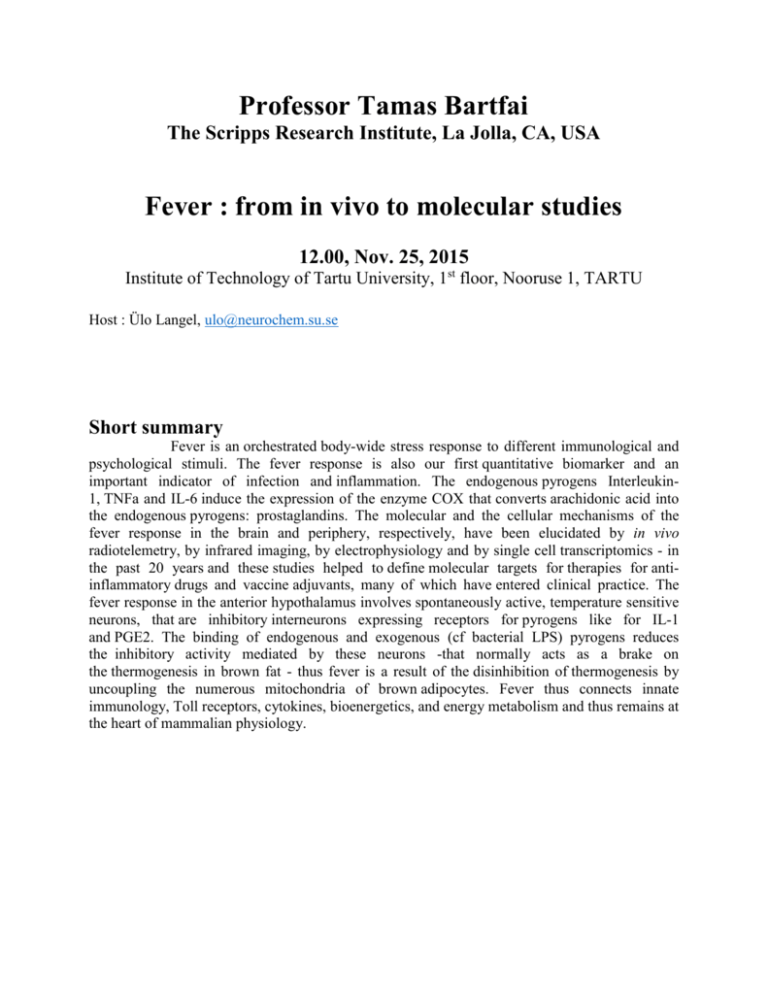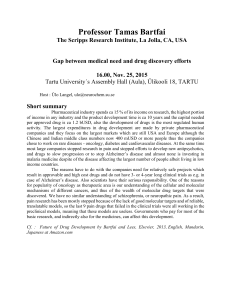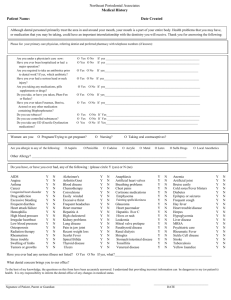Professor Tamas Bartfai The Scripps Research Institute, La Jolla, CA
advertisement

Professor Tamas Bartfai The Scripps Research Institute, La Jolla, CA, USA Fever : from in vivo to molecular studies 12.00, Nov. 25, 2015 Institute of Technology of Tartu University, 1st floor, Nooruse 1, TARTU Host : Ülo Langel, ulo@neurochem.su.se Short summary Fever is an orchestrated body-wide stress response to different immunological and psychological stimuli. The fever response is also our first quantitative biomarker and an important indicator of infection and inflammation. The endogenous pyrogens Interleukin1, TNFa and IL-6 induce the expression of the enzyme COX that converts arachidonic acid into the endogenous pyrogens: prostaglandins. The molecular and the cellular mechanisms of the fever response in the brain and periphery, respectively, have been elucidated by in vivo radiotelemetry, by infrared imaging, by electrophysiology and by single cell transcriptomics - in the past 20 years and these studies helped to define molecular targets for therapies for antiinflammatory drugs and vaccine adjuvants, many of which have entered clinical practice. The fever response in the anterior hypothalamus involves spontaneously active, temperature sensitive neurons, that are inhibitory interneurons expressing receptors for pyrogens like for IL-1 and PGE2. The binding of endogenous and exogenous (cf bacterial LPS) pyrogens reduces the inhibitory activity mediated by these neurons -that normally acts as a brake on the thermogenesis in brown fat - thus fever is a result of the disinhibition of thermogenesis by uncoupling the numerous mitochondria of brown adipocytes. Fever thus connects innate immunology, Toll receptors, cytokines, bioenergetics, and energy metabolism and thus remains at the heart of mammalian physiology. Tamas Bartfai, Ph D, professor Department of Chemical Physiology, The Scripps Research Institute, La Jolla, CA Professor of Drug Discovery, Oxford University, (Vis) Adjunct Professor, Department of Pharmacology, University of Pennsylvania, Philadelphia , PA Adjunct Professor Department of Neurochemistry, University of Stockholm Research Focus Professor Tamas Bartfai, Ph.D., focuses on two main research areas: 1) the roles of neuropeptide galanin in depression, anxiety, and seizures; and 2) fever, cytokine action in the brain and thermoregulation. The neuropeptide galanin has been found to influence several physiological processes such as cognition and memory, and regulation of mood. This is achieved at three galanin receptor subtypes that control the release of various neurotransmitters and hormones (e.g., acetylcholine, noradrenaline, glutamate, dopamine, insulin, growth hormone, prolactin). Despite being among the most common pathophysiological signs of disease, we know little about fever. By studying the actions of fever producing substances, pyrogens in the brain, we are learning about fever, an adaptive stress response to microbial infection and to psychological stress. The center of the fever response is the warm sensitive and pyrogen sensitive neuron that is being characterized in great molecular detail; providing insights into how temperature regulation, metabolic rate and aging are correlated. There is a strong emphasis on the translational aspects of the research. Dr Bartfai has been involved in industry and academia in the development of several drugs that are in clinical use and he brings this angle of investigation to each experiment in the laboratory and the department. Education Ph.D., Biochemistry, Stockholm University, 1973 B.S., Physics and Chemistry, Eötvös Loránd University, Budapest, Hungary, 1971 Professional Experience 1986-1995 Neurochemistry (Chair), University of Stockholm, Stockholm, Sweden 1999-2003 Department of Biochemistry, The Karolinska Institute, Stockholm, Sweden 2000-2012 Professor, Molecular and Integrative Neurosciences Department, The Scripps Research Institute 2006-2011 Chair, Molecular and Integrative Neurosciences Department, The Scripps Research Institute 2011 Professor of Drug Discovery, Department of Pharmacology, University of Oxford, UK 2012 Professor, Department of Chemical Physiology, The Scripps Research Institute Adjunct professorships: University of Pennsylvania, Philadelphia, PA; the Rockefeller University, New York, NY Industry: 1995-2000 Hoffmann-La Roche, Basel, Switzerland, Sr. VP, Head of Neurology and Psychiatry Drug Discovery 2002-2008 Advisor Novartis, Neuroscience 2009 Advisor Pfizer Neuroscience, Metabolic Disease area 2008-2010 Head of SAB, Pfizer Incubator Awards & Professional Activities Eotvos Medal 1966, Budapest, Hungary; Swedberg Prize 1985, Royal Swedish Academy; Ericsson Prize 1996 Royal Swedish Academy (shared);Ellison Medical Foundation Senior Scholar Award 2002; Member, Hungarian Academy of Sciences; Member, Academia Europaea; Member, Society for Neuroscience; Member, Cytokine Society; Member, Scientific Advisory Board, The Blanchette Rockefeller Neurosciences Institute Editorial Boards: Nature, Molecular Pharmacology Editor-in-chief: Drug Discovery Mechanisms








